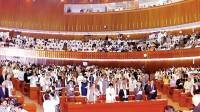It may be a noble intent but critics are lambasting the government for allegedly infringing the rights of citizen through the Protection of Pakistan Ordinance (PPO) 2013, and also the lawmakers for choosing the timesaver passage (Ordinance instead of a bill).
According to the parliamentary procedure, a bill with respect to any matter in the federal legislative list may originate in either of the two houses (Senate or National Assembly) and undergoes a few stages including deliberations by the relevant standing committee comprising members from the government and opposition.
On the other hand, the President may, (except when the National Assembly is in session), if satisfied that circumstances demand immediate action, make and promulgate an Ordinance.
An ordinance in other words does not include input from lawmakers.
The PPO was promulgated in October 2013 and its text was kept secret. This raised quite a few eyebrows. Later, rights activists, legal experts and the opposition said it would convert into a “security state.”
However, the government, despite all odds, managed to give the ordinance another 120 days on February 6 during the 8th session of the National Assembly.
On January 21, when NA Standing Committee on Interior approved the ordinance, those who differed with it were from Pakistan Tehreek-e-Insaaf (PTI) and Muttahida Qaumi Movement (MQM). The main opposition, Pakistan People’s Party (PPP) did not join hands with other opposition groups.
“It is (promulgation of ordinance) not democratic practice but at the same time it is not illegal,” said the Executive Director Pakistan Institute of Legislative Development and Transparency (PILDAT) Ahmed Bilal Mehboob.
Mehboob said the Constitution allows the government to promulgate an ordinance and get one time extension.
He said the ordinance has been extended for 120 days and it has been done through the majority votes. “Actually, it is like passage of a law which is done through majority votes,” he added.
Referred to the 18th Constitutional Amendment he said earlier the government could extend an ordinance for unlimited times, but now it can only be done once.
This is not ideal but we are in difficult times and extraordinary circumstance demand extraordinarily measures. We are in a state of war which demands special measures and in such circumstances human rights are not always protected, he said.
Commenting on the powers bestowed upon security agencies, he said, “Existence of a law (even through ordinance) is better than having no law at all. There would have been extrajudicial measures had there been no law and it is good that the acts (of security agencies) come within the ambit of a law.”
Responding to a question, he said promulgation and then extension of the ordinance has ignited a debate in society about its pros and cons which is a good sign.
“This law should not be made permanent though it has been extended for 120 days,” said Defence Analyst and Director Pakistan Institute of Peace Studies (PIPS) Muhammad Amir Rana.
He noted that there were several clauses which were conflicting with the basic human right guarantees envisaged by the Constitution.
The writer is a journalist based in Islamabad.



















